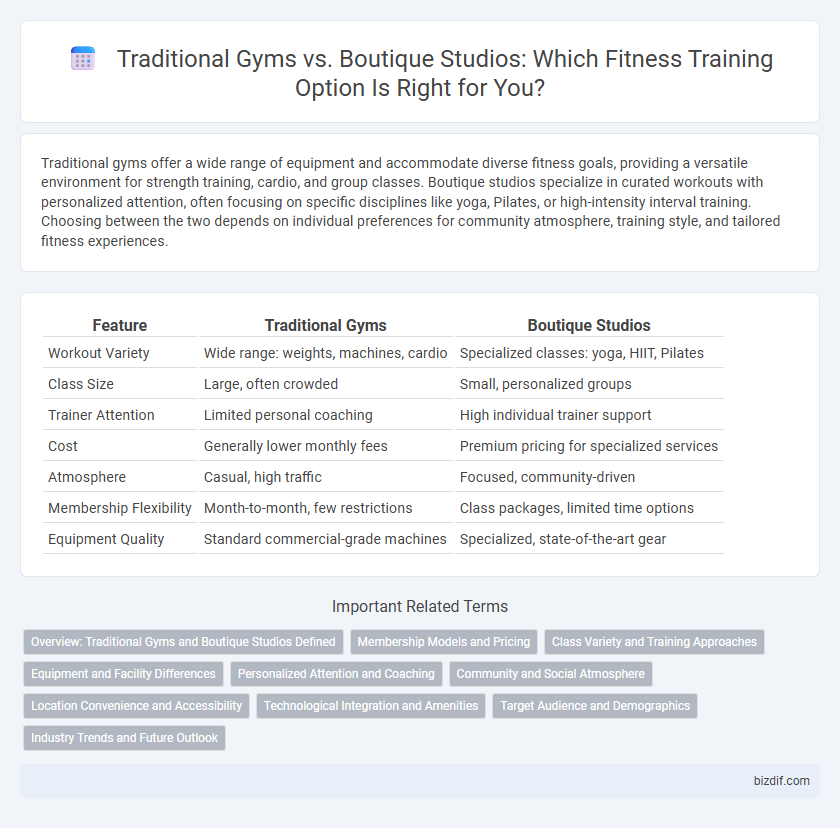Traditional gyms offer a wide range of equipment and accommodate diverse fitness goals, providing a versatile environment for strength training, cardio, and group classes. Boutique studios specialize in curated workouts with personalized attention, often focusing on specific disciplines like yoga, Pilates, or high-intensity interval training. Choosing between the two depends on individual preferences for community atmosphere, training style, and tailored fitness experiences.
Table of Comparison
| Feature | Traditional Gyms | Boutique Studios |
|---|---|---|
| Workout Variety | Wide range: weights, machines, cardio | Specialized classes: yoga, HIIT, Pilates |
| Class Size | Large, often crowded | Small, personalized groups |
| Trainer Attention | Limited personal coaching | High individual trainer support |
| Cost | Generally lower monthly fees | Premium pricing for specialized services |
| Atmosphere | Casual, high traffic | Focused, community-driven |
| Membership Flexibility | Month-to-month, few restrictions | Class packages, limited time options |
| Equipment Quality | Standard commercial-grade machines | Specialized, state-of-the-art gear |
Overview: Traditional Gyms and Boutique Studios Defined
Traditional gyms offer extensive facilities with a wide range of equipment, open for general membership and catering to diverse fitness needs. Boutique studios specialize in targeted workouts such as yoga, Pilates, or high-intensity interval training, often providing personalized coaching in a smaller, community-focused environment. Both models prioritize fitness but differ significantly in scale, atmosphere, and program specialization.
Membership Models and Pricing
Traditional gyms typically offer a range of membership tiers, including monthly, annual, and family plans, often at lower price points due to their larger scale and extensive facilities. Boutique studios focus on specialized fitness experiences with pricing based on class packages or prepaid memberships, reflecting personalized coaching and smaller group sizes. Membership flexibility and the value of tailored programs make boutique studios more expensive but attractive to clients seeking niche fitness training.
Class Variety and Training Approaches
Traditional gyms offer a wide range of equipment and facilities catering to diverse fitness goals, including weightlifting, cardio, and functional training, ideal for self-directed workouts. Boutique studios specialize in targeted fitness classes such as yoga, Pilates, HIIT, and barre, providing personalized coaching and community-driven environments. The training approach in traditional gyms emphasizes flexibility and independence, while boutique studios prioritize guided, instructor-led sessions that often incorporate innovative fitness trends.
Equipment and Facility Differences
Traditional gyms offer a wide range of high-tech machines, free weights, and extensive cardio equipment, catering to diverse fitness needs under one roof. Boutique studios emphasize specialized, often custom-designed equipment tailored to specific workout styles like Pilates, yoga, or HIIT, creating a more intimate and focused environment. Facility sizes differ significantly, with traditional gyms providing spacious layouts and longer operating hours, while boutique studios prioritize ambiance and community through smaller, meticulously designed spaces.
Personalized Attention and Coaching
Boutique studios excel in personalized attention by offering tailored coaching and small class sizes that enhance individual progress, contrasting with traditional gyms where large member volumes often limit personalized interaction. Trainers in boutique studios typically provide customized workout plans and real-time feedback, fostering a more supportive and motivating environment. This focused approach accelerates fitness goals and improves technique more effectively than the generalized programs common in traditional gym settings.
Community and Social Atmosphere
Traditional gyms often provide a broad range of equipment and open access, fostering a flexible workout environment but sometimes lacking a tightly-knit community feel. Boutique studios prioritize specialized classes and small group settings, creating a strong sense of belonging and personalized interaction among members. This focus on social atmosphere enhances motivation and accountability, appealing to those seeking both fitness results and meaningful connections.
Location Convenience and Accessibility
Traditional gyms often provide multiple locations nationwide, offering greater accessibility for members who travel or relocate frequently. Boutique studios typically focus on specific neighborhoods or cities, ensuring convenience for local clients seeking specialized training. Proximity to home or workplace significantly influences commitment and consistency in fitness routines.
Technological Integration and Amenities
Boutique studios often leverage advanced fitness technology, including app-based class bookings, wearable integration, and personalized workout tracking, enhancing user engagement beyond what traditional gyms typically offer. Traditional gyms provide a wide range of amenities like extensive weight rooms, swimming pools, and sports courts, catering to diverse fitness preferences but may lack the seamless digital experience found in boutique settings. The integration of smart equipment and virtual coaching in boutique studios creates a highly interactive and customizable environment that appeals to tech-savvy fitness enthusiasts.
Target Audience and Demographics
Traditional gyms appeal primarily to a broad demographic, including budget-conscious individuals and those seeking a wide range of equipment and services in one location. Boutique studios attract a niche market, often targeting fitness enthusiasts aged 25-45 who value specialized classes, personalized coaching, and community-driven experiences. The preference between these options largely depends on lifestyle, fitness goals, and willingness to pay a premium for tailored workouts.
Industry Trends and Future Outlook
Traditional gyms continue to dominate the fitness industry with broad service offerings and extensive equipment, attracting a wide demographic. Boutique studios, emphasizing specialized classes and personalized experiences, are rapidly growing, driven by consumer demand for community and targeted workouts. Industry trends indicate a future shift towards hybrid models combining convenience technology with unique, immersive fitness experiences.
Traditional Gyms vs Boutique Studios Infographic

 bizdif.com
bizdif.com